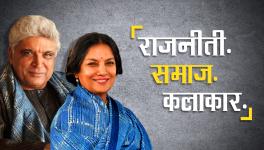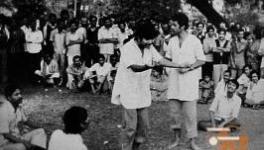What is Peepli Live About?
Down the bowels of a broken land where numbers live like men,
Where those who keep their senses have them taken back again,
Where the night stick cracks with crazy rage, where madmen don’t pretend,
Where wealth has no beginning and poverty no end.
Don McLean, “Homeless Brother”
Peepli Live is a remarkable film for many reasons, the least of which is that it deals with farmers’ suicides. There is hardly any agriculture in the film. We are not told, for instance, what Natha and Budhiya actually cultivate. Nor are we told why they are unable to repay the loan, which they took for “angrezi ilaj.” There is no reference to the exact nature of the collapse they face – is it to do with the government’s procurement price, or have world prices for their produce crashed, has the rain failed, was it an outbreak of pestilence, have seed prices gone up, has access to water been cornered by the rural rich, or is it a combination of some of these factors, or is it something else altogether? There is no reference to the government’s agriculture policies, even though we see the agriculture minister quite often. And most certainly, there is no effort to link Natha and Budhiya’s fate to the process we have come to loosely call “globalization.” Indeed, after the first few minutes, we almost forget that Natha and Budhiya are farmers – Natha could be any poor man driven to the brink of suicide, around whom a media circus unfolds.
Which is what the film is actually about, of course: the media circus. Virtually every review has commented on this aspect of the film, and there is no doubt that writer-director Anusha Rizvi, with her television journalist background, digs into this material with gusto, feistily. She and her co-director Mahmood Farooqui have a superb eye for character, and their casting of the television characters is flawless – the female English newscaster, the male Hindi newscaster, their respective bosses, the local stringer, the other journalists who swoop down on Peepli – each face is distinct, and each represents a “type” perfectly.
On the whole, the casting is superb. Omkar Das Manikpuri as Natha, Shalini Vatsa as his wife, Raghuvir Yadav as Budhiya, the old mother, all fit their roles perfectly. And it’s not just that they fit the role. The acting is also very, very good. Manikpuri is simple without being soft in the head. Vatsa is spirited without being uncaring. Yadav is calculating without being scheming – in fact, his is the most difficult role in the film, because he has to instigate his brother to suicide without becoming the villain of the piece. Yadav maintains the balance beautifully. If he is calculating and street smart, he is so only in comparison to his somewhat naïve brother. But Budhiya is not a man who will escape any crisis unscathed, landing invariably on his feet. He has an aura of vulnerability and helplessness that is actually critical to the film. Even though he instigates his brother to suicide, we see no sibling rivalry. He is a man pushed to the edge, responding to a crisis he has no idea how to get out of, clutching at straws. Poverty dehumanizes, and Raghuvir Yadav’s Budhiya is a victim of poverty.
The only jarring note in the casting is Naseeruddin Shah as Salim Kidwai, the union agriculture minister. Given the realities of India’s politics, ministers of agriculture tend to have a non-urban persona. Recall some of the recent worthies who have warmed that chair – Sharad Pawar, Nitish Kumar, Rajnath Singh, Chaturanan Mishra. Rizvi makes Salim Kidwai too urbane, polished.
It is absurd to place Peepli Live in the tradition of Do Beegha Zameen or Mother India, as some reviewers have done. Do Beegha Zameen and Mother India are themselves both very different sorts of films, the former closer to neo- and socialist realisms, the latter firmly melodramatic. Nor is Peepli Live similar to Jaane Bhi Do Yaaro. While the latter was an over the top farce, comically absurd, the former is a realistic tragedy with black humour.
Peepli Live is not so much about farmers and their plight, as it is about the apathy, callousness and opportunism of the urban and rural rich. The rural potentates who laughingly put the idea of suicide and compensation in Budhiya’s head are tied symbiotically to the English-speaking journalist for whom Natha’s promised death is more newsworthy than the actual death of an emaciated rural worker. In the end, Rizvi doesn’t allow us the comfort of a happy end. Natha is presumed dead and all his family gets is mounds of plastic garbage and five minutes of fame. Natha himself resurfaces in the city, at a construction site, faceless and nameless, one among the millions of dispossessed, staring into nothingness.
If a cinematic precursor to Peepli Live is to be sought, it is the 2001 Bosnian film, No Man’s Land. Both films are parables about the establishment, which, through a series of actions, manages in the end to do precisely nothing, and the media, which is only interested in the sensation and the spectacle, not the issue. In both films, the protagonist is stuck – damned if he moves, damned if he doesn’t. And both end chillingly similarly – we see everybody leaving, abandoning the protagonist to anonymity and death.
The spotlight, then, is not on the protagonist, but on us, vicarious, voyeuristic consumers of misfortune.
Get the latest reports & analysis with people's perspective on Protests, movements & deep analytical videos, discussions of the current affairs in your Telegram app. Subscribe to NewsClick's Telegram channel & get Real-Time updates on stories, as they get published on our website.



















